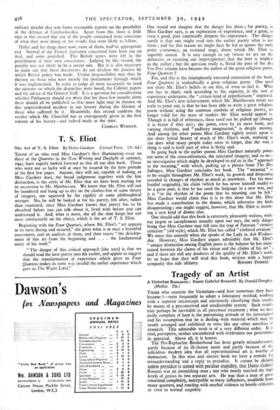T. S. Eliot
The Art of T. S. Eliot. By Helen Gardner. (Cresset Press. 12s. 6d.) THOSE of us who read Miss Gardner's first illuminating essay on three of the Quartets in the New Writing and Daylight of summer, 1942, have eagerly looked forward to this all too slim book. Those who were not so lucky will at once be assured by the firm prelude of the first few pages. Anyone, they will say, capable of making, as Miss Gardner does, the broad judgement together with the fine distinction, is the critic of Mr. Eliot that we have been waiting for in succession to Mr. Matthiessen. We know that Mr. Eliot will not be laundered and hung up to dry on the clothes-line of some theory of imagery, nor squeezed by the rigidity of some philosophical wringer. No, he will be looked at for his poetry, felt after, rather than examined, since Miss Gardner knows that poetry has to be absorbed before you can talk about it, lived with before you can understand it. And, what is more, she all the time keeps her eye most satisfactorily on the object, which is the art of T. S. Eliot.
Beginning with the Four Quartets, where Mr. Eliot's "art appears at its most daring and assured," she gives what is at once a beautiful assessment, and an analysis of them, and then traces " the develop- ment of this art from the beginning and . . . the fundamental unity of his work."
" The danger of this critical approach [she says] is that we should read the later poetry into the earlier, and appear to suggest that the transformation of experience which gives us Four Quartets makes in some way invalid the earlier experience which gave us The Waste Land."
One would not imagine that the danger lies there ; for poetry, as Miss Gardner says, is an exploration of experience, and a great,' or even a good, poet continually deepens his experience. The danger surely is that one might read into the earlier poetry what is not there ; and for this reason we might here be led to ignore the early
poite contumace, an essential stage, above which Mr. Eliot so
superbly soared. It is easy enough to say (when we are on the defensive, or excusing our impercipience) that the later is implicit
in the earlier ; but the question really is, Need the poet of the Ara Vos Prec volume have become the author of the great religious poem, Four Quartets?
For, and this is the triumphantly executed contention of the book, Four Quartets is undoubtedly a great religious poem. One need
not share Mr. Eliot's beliefs to see this, or even to feel it. What one has to share; each according to his capacity, is the sort of .experience undergone, the " certain kind of apprehension " imparted. And Mr. Eliot's new achievement, which Mr. Matthiessen wrote too early to point out, is that he has been able to write a great religious poem without using the common symbols of religious poetry, no longer valid for the mass of readers Mr Eliot would appeal to. Though it is full of references, these need not be picked up (though it is better if they are); the poem, even by its mere form, and varying rhythms, and "auditory imagination," is deeply moving. And among the other points Miss Gardner rightly insists upon is ihe sheer lyrical beauty of much of Mr. Eliot's work, realising as she does what many people today seem to forget, that the way a thing is said is itself part of what is being said.
In going back to the earlier poems Miss Gardner naturally points out some of the cross-references, the reiterated imagery, and so on— an investigation which might be developed to aid us in the " approach to the meaning," with which, picking up a phrase from The Dry Salvages, Miss Gardner concludes her book. The " meaning " is to be sought throughout Mr. Eliot's work, its growth and deepening revealed in changes of rhythm as much as anywhere. For his most fruitful originality, his claim (which he has never himself made) to be a great poet, is that he has used the language in a new way, and it is "in the rhythm of the poem that its meaning can be felt" Miss Gardner would claim that it is in this alone that Mr. Eliot has made a contribution to the drama, which otherwise she finds disappointing ; one might suggest, however, that Mr. Eliot is invent- ing a new kind of drama also. One should add that this book is extremely pleasantly written, with- out jargon or cacophonous assaults upon our cars, the only danger being that Miss Gardner may fall into the trap of Paterian " creative criticism " (old style), which Mr. Eliot has called " etiolated creation." We sense this uneasily when she speaks of the Lady in Ash Wednes- day. However, Miss Gardner argues admirably that Mr. Eliot', " unique distinction among English poets is the balance he has main- tained between the claims of his vision and the claims of his art " ; and if there are still any doubters of the quality of Mr. Eliot's work, let us hope that they will read this book, written with a happy














































 Previous page
Previous page